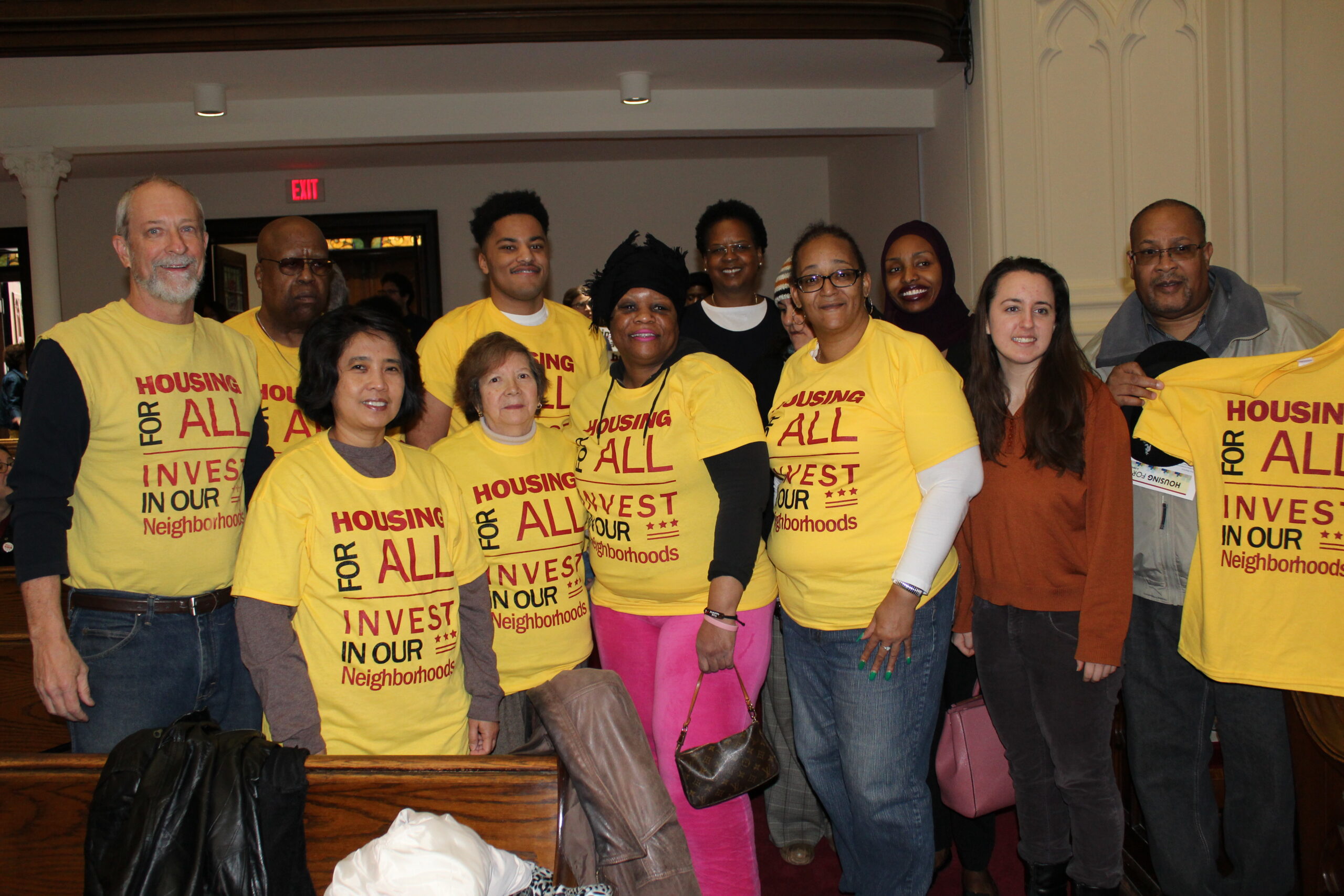As we get close to concluding our celebration of 50 years of impact, or our Jubilee Year, we continue to reflect on our founding principles to guide us in the future: Filling gaps through access to deeply affordable housing, onsite and nearby services, and the essential resources of high-opportunity neighborhoods — Justice Housing®, breaking down boundaries by bringing those cut off from opportunity back into the circle of belonging, and resetting the system by interrupting unfair practices at the systemic level and replacing them with just pathways forward that have impact far beyond our neighborhood.
This month, we reflect on Jubilee’s history of advocacy for our residents and neighborhoods and for city-wide policies that provide housing access and supportive programs for that ensure that residents and families have the security and stability they need to thrive, helping them break the cycle of poverty and achieve their dreams.
We reflect on this crucial and expanding component of Jubilee’s work with a special interview and spotlight with long-time Jubilee Vice President of Strategic Initiatives Marty Mellet and new Vice President of External Affairs Tyrell Holcomb.
50th Anniversary Stories
Jubilee’s Collaboration with CNHED to Advocate for Affordable Housing
A turning point for Jubilee Housing came when it recognized that achieving lasting impact required collaboration on a citywide scale. Moving beyond maintaining its existing properties, Jubilee set its sights on growth, realizing that partnerships with other organizations would be key to accessing the tools and resources necessary to expand. This strategic shift led to deeper alliances across Washington, DC, particularly with collectives that shared Jubilee’s vision for equitable housing and policy reform.
In Washington, DC, the Coalition for Nonprofit Housing and Economic Development (CNHED) stands at the forefront of tackling the city’s affordable housing and community development challenges. Under the leadership of Stephen “Steve” Glaude, President and CEO, CNHED has been a powerful force, mobilizing nonprofits, businesses, and government entities to create meaningful change in underserved neighborhoods.
As Steve notes, “The creation of CNHED came from the merger of two coalitions with a shared vision: to advance programs, policies, and investments in affordable housing and community economic development. One key purpose was to better align housing with economic development initiatives, ensuring that organizations’ voices were amplified to advocate for their work and foster connections with district leaders. This support aimed to shape how the district allocates its budget to advance these critical goals.
CNHED has sought to be guided by the expertise of practitioners working daily in communities, navigating funding, compliance, and program requirements. The coalition’s primary purpose has been to harness these voices to shape better policies and programs, enhancing the work that directly serves residents. CNHED’s effectiveness has relied heavily on the involvement, input, and engagement of its members.
Jubilee Housing has consistently been a pivotal leader in this coalition. Jubilee has lent valuable expertise to CNHED’s policymaking from the beginning. Jim Knight, [Jubilee Housing President and CEO] and former chair of CNHED, and Marty Mellett [Jubilee Housing former Vice President of Strategic Initiatives], who served actively in working groups, the housing committee, and as board treasurer, both exemplify Jubilee’s deep-rooted impact. Their contributions have strengthened CNHED’s mission, particularly in affordable housing.”
Reflecting on Jubilee Housing’s influence in driving the conversation around support for CNHED’s initiatives, Marty shares: “Working closely with Jim, who had strong relationships with stakeholders, our efforts were a collaborative approach. Together, we ensured Jubilee’s voice was heard in key policy discussions, particularly around the Tenant Opportunity to Purchase Act (TOPA), affordable housing preservation, and the role of rental housing in the city’s overall housing ecosystem. Within CNHED, I was part of the team that established a working group for rental housing. Through our collective efforts, we negotiated support for or opposition to various pieces of legislation, helping to protect essential programs like the Local Rent Supplement Program (LRSP). LRSP operates similarly to federal rental subsidies like Housing Choice Vouchers but is funded by the city for residents with the lowest incomes. Under LRSP, tenants pay 30% of their income toward rent, with the city covering the rest. This model helps bridge the affordability gap. Jubilee’s position as a housing provider strengthened CNHED’s advocacy by offering a direct, practical perspective. Jubilee illustrated how essential LRSP was for maintaining affordable housing and highlighted the broader implications if the program were reduced or eliminated. Additionally, as the economic landscape of Washington, DC, shifted, with rising incomes and a greater focus on amenities like parks and retail, Jubilee consistently reminded policymakers that a significant need for low-income housing still existed. This advocacy ensured that LRSP remained a priority, even as the city’s economic and racial demographics evolved.”
For nearly a decade, CNHED built momentum in strengthening investments in affordable housing, with the District leading the nation in per capita investments, through the Housing Production Trust Fund, LSRP, and in other housing initiatives. Steve emphasizes that “Now, however, we are faced with significant disruption to the momentum. We’re in a post-pandemic economy with a 20% vacancy rate downtown and 40,000 federal workers who haven’t returned to their offices. Even with 80% occupancy in the area, only 46% of employees are back at their desks. This situation means income that would typically support downtown’s small businesses—restaurants, hair salons, dry cleaners—is leaving the district. That revenue traditionally funds D.C.’s affordable housing initiatives and supports the programs that CNHED members offer. Additionally, the city has been slow to revert certain pandemic-era practices, like eviction moratoriums and rent payment policies, back to pre-pandemic terms, which is significantly impacting housing providers. Not only housing providers, but human services, small businesses, and community lenders are all experiencing this ripple effect across the district’s footprint.
CNHED’s current focus is working closely with government partners to adjust policies and programs without destabilizing the housing providers who face tenants unable to pay rent for two or three years due to ongoing economic challenges. Like every other city, DC. is adapting to unique circumstances that directly affect the work of CNHED members. At this stage, it’s not about assigning blame but moving from aspiration to actionable solutions. This shift requires CNHED to think differently, perhaps compromise more than it would in normal times, and seek remedies to support the community organizations facing significant challenges.
We aim to recover the momentum we had before the pandemic. As city revenues stabilize and the budget becomes more manageable, there will need to be a renewed effort in public awareness and building political will to regain our prior progress. Once momentum is interrupted, it often requires renewed advocacy, organizing, and public education to return to previous levels of engagement and commitment. We’re keeping a close watch on the readiness of city leaders to restore this momentum, while also addressing urgent issues like evictions. The goal is to identify those who can return to stability with policy shifts and to direct resources to those still in need, addressing underlying structural challenges through thoughtful policy and program adjustments.”
By consistently communicating the importance of affordable housing and pushing back against sentiments suggesting that the city can no longer afford to support affordable housing initiatives and that enough has been done in terms of housing, CNHED and Jubilee reinforce the necessity of continued investment in housing solutions. This ongoing dialogue helps maintain pressure on local authorities to prioritize affordable housing policies and encourages policymakers to recognize the ongoing need for support, ensuring that the community’s needs are not overlooked in favor of market-driven solutions.
At CNHED’s recent Silver Jubilee 25th Anniversary Gala, Marty was honored with the Bob Pohlman Lifetime Achievement in Community Development Award—awarded annually to an outstanding local leader with at least 20 years of consistent service and leadership in the District of Columbia’s community development field.

